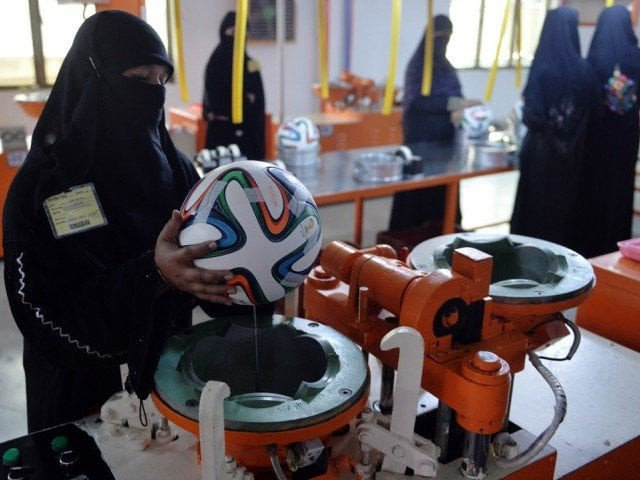Despite calls for gender parity, glass ceiling remains intact for women
Pakistan has the lowest percentage of women in managerial positions — a meagre 3%

PHOTO: AFP
Although women have come a long way, achieving gender parity seems like a distant goal. The World Economic Forum estimated in 2015 that the gender gap will not close entirely until 2133. Female participation in the labour market has been termed as increasingly significant for economic growth and development at both national and enterprise levels by academics and researchers.
This has also been corroborated by a recent IMF Working Paper.
The paper researched into the link between gender diversity in senior corporate positions and financial performance of 2 million companies in Europe. The authors document a positive correlation between corporate return on assets (ROA) and the share of women in senior positions. More precisely, replacing one man by a woman in senior management or on the corporate board is associated with 8–13 basis points higher ROAs.
The authors have argued that greater representation of women would bring in a heterogeneity of beliefs, attitudes and values that would aid decision making, especially in knowledge intensive and high technology sectors. The authors have also argued that the association between gender equality and firm performance is significantly stronger in firms that employ more women in the labour force.
Global overview
According to the ‘Women in Business and Management Gaining Momentum’ global report published by the International Labour Organization (ILO) in 2015, Pakistan has the lowest percentage of women in managerial positions in the world standing at a meagre 3%.
Jamaica stands as the country with the highest percentage of females in managerial positions in the world at 59.3%. Interestingly, it is not any of the advanced economies but Colombia and St. Lucia which stand after Jamaica with the proportion of women in managerial positions standing at 53.1% and 52.3%.
Gender gaps remain stark; the ILO company survey found that 30% of respondent companies had no women on boards while 65% of the companies had less than 30% women (30% is taken as the critical mass required for women’s voices and views to be taken into account).
Even in the case of advanced economies the situation seems bleak. Although many women have joined the workforce in Europe over the past few decades, there are surprisingly very few women who hold positions at top corporate firms. Numbers evidence this fact: women only occupied 19% of corporate board seats and 14% of senior executive positions in the 600 largest companies in Europe. Even more striking is the fact that only 4% of the chief executive positions of these companies were held by women.
The Pakistani experience
Common gender stereotypes rooted in cultural and religious norms where men and women are expected to perform different social and economic roles form obstacles for women to enter the labour force in Pakistan and other developing countries.
Traditionally, running businesses, management roles and decision making are considered the domains of men. Inadequate labour and non-discrimination laws also serve as barriers for women to rise to the top.
Although very few women in Pakistan have broken cultural barriers and entered male dominated fields, the country has produced examples of powerful professional women with the likes of well-known Pakistan Software Houses Association President Jehan Ara to the country’s youngest CEO and most successful investment banker, Maheen Rehman. Maheen’s accolades are also recognised internationally as she is ranked number five on Forbe’s ‘Top 40 Under 40’ list. Speaking to BBC, she hopes that the Pakistani financial sector would expand and more women would make it to the board room.
Nevertheless, the progress in reducing the gender gap remains “glacial”. Several measures have been taken by companies worldwide to break the glass ceiling for women to rise. Some policy measures taken are offering flexible hours of working to manage home and work, giving access to skills training, and better recruitment, retention and promotion policies.
The writer is an economist and ex-central banker
Published in The Express Tribune, March 14th, 2016.
Like Business on Facebook, follow @TribuneBiz on Twitter to stay informed and join in the conversation.



















COMMENTS
Comments are moderated and generally will be posted if they are on-topic and not abusive.
For more information, please see our Comments FAQ